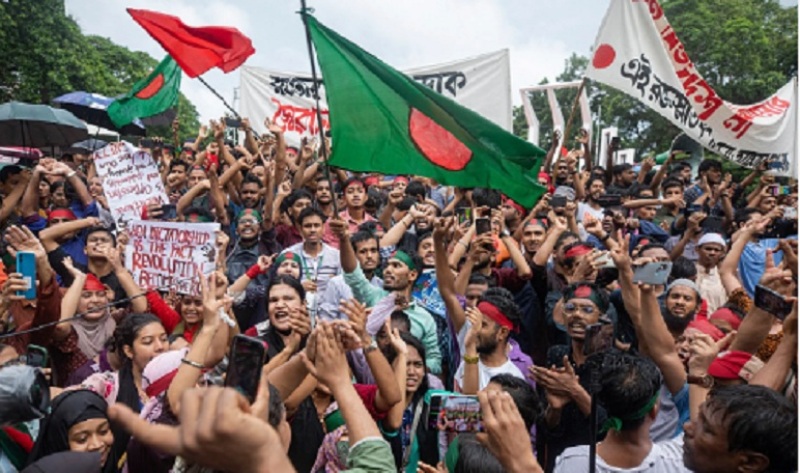As the people of Bangladesh recall today the clarion call for freedom made by Bangabandhu Sheikh Mujibur Rahman on 7 March 1971, they know that it is a new struggle they are now engaged in to defend their history.
The political crisis, which overtook the nation in early August last year, deepens in Bangladesh.
With a new political party, the National Citizen Party, formed by student followers of the Yunus regime, there is the expectation among some quarters that politics will take a new course in the coming months.
And the months ahead are important in any calculation, owing to the fact that the interim government is expected to set a definitive timeframe for new elections.
That of course does not mean that this expectation will be fulfilled for the good reason that the regime has so far appeared disinclined to demonstrate any election-related enthusiasm so far.
There are good reasons why Muhammad Yunus and his administration are reluctant to go for any election measures despite the reiteration by General Waker-Uz-Zaman, the army chief, in mid-February that he had earlier stated that fresh elections would be organised within eighteen months of the interim government’s taking over.
One simply has to wait and see if the general’s expectation is translated into reality.
With the Jamaat-e-Islami, once the junior partner of the Bangladesh Nationalist Party (BNP) in government but today extremely influential, clearly opposed to parliamentary elections before local elections are held, the Yunus regime obviously feels pretty much a sense of relief.
But that sort of relief may turn out to be short-lived, given that the BNP in recent weeks has been ramping up its demand for parliamentary elections to be held first in order for an elected government to take charge of the country.
The party leadership has of late been careful to mention the objectives it has before it. It has repeatedly laid emphasis on the fact that all the reforms the interim administration has been engaged in will need to depend on an elected parliament for ratification.
Additionally, the BNP, whose acting chairman Tareque Rahman has so far been unable to return home from his long exile in Britain (a number of cases against him are yet to be withdrawn), has made it known that it does not agree with the plan of Yunus’ supporters for an abrogation of the country’s constitution as it was adopted in 1972.
The party’s leaders, along with Dr Kamal Hossain (who served as law minister and then as foreign minister in Bangabandhu Sheikh Mujibur Rahman’s government in the 1970s and was a leading force in the enactment of the constitution), has suggested that reforms be made to the constitution rather than a new constitution being imposed on the country.
Additionally, the BNP has been clear in its opinion that no ban should be clamped on the Awami League. Anti-AL groups, which routinely refer to the Awami League as a fascist organisation, have been vocal in demanding a ban on the party.
The BNP’s position has made the Yunus regime pause. Indeed, all the reforms undertaken by the interim administration appear to have stalled, despite the submission of reports on them to Professor Yunus in recent times.
What is most concerning, though, is apparently the regime’s failure or unwillingness to rein in its extremist supporters, one of whom made the rash statement the other day that until Sheikh Hasina is convicted and hanged no one ought to raise any demand for elections.
That is a sign of the Yunus regime’s failure to assert its leadership over its young adherents. It is not a good sign of the future for the regime, whose constitutional legitimacy remains a huge question.
The issues facing the nation keep piling up. Vigilantes accosted a couple of young women smoking at a tea stall and subjected them to physical humiliation.
The incident led to an angry response from netizens, but that did not prevent the home affairs advisor of the interim government, a retired lieutenant general, from voicing his opinion that smoking cannot be indulged in at open spaces.
What was forgotten was that smoking cannot be undertaken in offices and other establishments where it poses a danger to public health.
The interim government thus operates, or does not operate, on shaky ground. Professor Wahiduddin Mahmud, who had been in charge of the education ministry, was stripped of his responsibilities a few days ago, though he continues to have supervision of the ministry of planning.
The young Nahid Islam, who had been heading the ministry of information and broadcasting since August last year, quit office since he wished to serve as convenor of the new National Citizen Party. He was replaced by another young member of Yunus’ team.
The new director general of the Shilpakala Academy angrily resigned last week because, as he put it, he was not getting any cooperation from the ministry of culture.
For Bangladesh’s people, there is hardly any ray of hope about the road ahead. The secular structure of the republic has been taking increasingly horrific assaults.
At Khulna University, a spree of name changes of academic buildings has been resorted to, with the names of such prominent Bengalis as Acharya Prafulla Chandra Roy, Jagadish Chandra Bose, Satyendra Nath Bose and Jibanananda Das removed from the buildings honouring them.
The name of Bangabandhu Sheikh Mujibur Rahman, Bangladesh’s founder, was removed as well from the academic building honouring his legacy.
Residential student halls named after such respected scholars as Professors Jyotirmoy Guhathakurta, Sukharanjan Samaddar, Govinda Chandra Deb and Rashidul Hasan, all of whom were murdered by the Pakistan army in 1971, have been given new names, a clear hint of the non-secular course the country has been pushed into in light of the Awami League government’s fall last year.
At Kushtia’s Islamic University, a hall named after Bangabandhu has been renamed as Shah Azizur Rahman hall.
It may be recalled that Shah Azizur Rahman, who publicly collaborated with the Pakistan army in 1971, led the Pakistani delegation to the United Nations at the height of Bangladesh’s War of Liberation. Imprisoned after liberation, he went on after his release to serve as Bangladesh’s Prime Minister under General Ziaur Rahman, the country’s first military ruler who opened the doors for Bengali collaborators of Pakistan to make their way back into politics in Bangladesh, a country whose independence they had violently opposed.
Political irony remains part of the narrative in Bangladesh today. Systematic and organised efforts are on to obliterate the nation’s historical heritage as it was shaped through the War of Liberation fifty-four years ago.
The media are careful about carrying reports or write-ups that could be construed as critical of the Yunus dispensation.
On the security front, law and order increasingly slides, with mobs pouncing on citizens and homes to commit broad daylight robbery.
The police, yet traumatised by the brutality they were subjected to in the aftermath of the political change of August 2024, have so far not regained the confidence to exercise their powers in ensuring citizens’ security.
With little reason for optimism about the immediate future, the feeling among citizens is simple and unequivocal: this slide in socio-political conditions can only be rolled back by a government based on legitimate public support.
ALSO READ: From Liberation War to fractured relations: History, heritage & diplomacy bind India and Bangladesh
And that support must come through a free and fair election that will devolve power back to the political parties.
The political landscape yet accommodates the BNP, the Jatiya Party and the Awami League, the last of which appears to be gaining in public support despite being fugitive in the current circumstances.
















